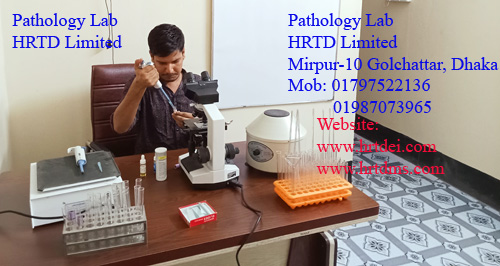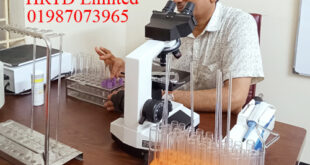Corona virus test in HRTD Medical institute

COVID-19 diagnostic testing shows current infection with the virus that causes coronavirus disease 2019 (COVID-19). The U.S. Food and Drug Administration (FDA) approved the following types of tests for diagnosing COVID-19.
Molecular tests
These tests look for genetic material from the COVID-19 virus.
Polymerase chain reaction tests, shortened to PCR tests, are molecular tests. The lab technique used is called reverse transcription polymerase chain reaction, shortened to RT-PCR. You also may see this type of test called an NAAT test, short for nucleic acid amplification test.
PCR tests are more accurate than the other type of COVID-19 test, called an antigen test. PCR tests may be done at home. But they are more likely to be done by a healthcare professional and processed in a lab.
Antigen tests
These tests look for viral proteins called antigens.
Antigen tests also may be called rapid COVID-19 tests or at-home COVID-19 tests. These tests give a quick result.
Antigen tests are accurate, but they are less accurate than PCR tests. This is especially true if you don’t have symptoms. If you take an antigen test and are negative for COVID-19, take another antigen test after 48 hours to check the results.
Tests for more than one virus
An RT-PCR test called the Flu SC2 Multiplex Assay can show any of three viruses at the same time: the COVID-19 virus, influenza A and influenza B. Only a single sample is needed to check for all three viruses.
Corona virus test has the same risks of false results as do other COVID-19 tests. Corona virus test
Products & Services

Why it’s done
In the U.S., you might need a COVID-19 diagnostic test if:
- You have COVID-19 symptoms, such as fever, cough, tiredness or shortness of breath. If you have symptoms, test right away.
- You were exposed to the COVID-19 virus. Wait at least five days after you’ve been exposed to take a test.
- A healthcare professional or your public health department suggests a test.
Testing before you plan to be with someone who has a high risk of serious illness from COVID-19 helps prevent the spread of the COVID-19 virus.
If you’ve had COVID-19 in the last 30 days and don’t have symptoms, you might not need to test even if tests are suggested.
Some people who have COVID-19 don’t have symptoms, called asymptomatic. But they can still spread the virus to others. People with no symptoms can be tested.
If people with no symptoms have a positive test result, they should follow guidelines for staying away from others. This helps keep the virus from spreading. Corona virus test
Diagnostic PCR test
What it tests for: It’s used to determine if a person is actively infected with SARS-CoV-2, the virus that causes COVID-19. Corona virus test
How it’s done: The test is typically performed on a nasal swab or saliva sample.
How it works: Corona virus test uses a technology known as polymerase chain reaction (PCR) to detect trace amounts of genetic material of SARS-CoV-2. Once a swab is taken, its viral RNA is isolated from the sample and then converted into a complimentary strand of DNA. Then using the PCR technique, the DNA is multiplied to create thousands of copies, allowing a large enough sample to test for SARS-CoV-2 genes.
Interpreting results: “PCR tests are very sensitive,” says Yura. “They will tell you if there is RNA in the sample from the virus of interest.” But, the PCR test can’t distinguish between whether the infection is contagious. “If you have positive PCR results and you also have a dry cough, fever, and other symptoms that are consistent with COVID-19, that is stronger evidence that you have an active infection and could infect others you come into contact with,” says Yura.
The currently available PCR tests can only determine whether the virus is detected or not, but not the quantity of virus present (i.e. viral load). To test the effectiveness of some COVID-19 treatments under study and help give individuals guidance on when they may no longer need to quarantine, having a test that is able to measure the change in viral load or whether the viral load detected is insufficient to be contageous would be helpful, says Yura. Corona virus test

Diagnostic Antigen test:
What it tests for: It’s used to determine if a person is actively infected with SARS-CoV-2, the virus that causes COVID-19.
How it’s done: Corona virus test is typically performed on a nasal or throat swab sample.
How it works: The test detects fragments of specific viral proteins. After a swab is collected, the sample is mixed with a liquid and then placed on a testing strip. As the sample flows down the test strip, SARS-CoV-2 antibodies in the test can recognize and bind to viral protein fragments, if present. This protein fragment-antibody complex appears as a visible, colored line.
Interpreting results: A key benefit of the antigen test is the rapid turaround time. However, since they are not as sensitive as a PCR test, they may not detect all active infections, meaning there is a higher chance of false negatives. Sometimes, negative results from an antigen test may need to be confirmed with a PCR test (e.g. when other symptoms are present). Corona virus test
Antibody or serology test:
What it tests for: It tests whether a person likely had a previous SARS-CoV-2 infection. The test does not diagnose an active infection or provide information about long-term immunity.
How it’s done: Corona virus test is a blood test.
How it works: Corona virus test is designed to detect specific antibodies against the SARS-CoV-2 virus, either immunoglobulin M (IgM) and/or immunoglobulin G (IgG). IgM antibodies appear within a few days of being infected, and then within about two to three weeks, IgG antibodies will ramp up. “It’s a process called seroconversion, where the body produces antibodies so that it can remember what it was infected with,” says Yura.
Interpreting results: Researchers don’t have enough data to conclude that a positive antibody test means a person will have immunity against the SARS-CoV-2. If they do have immunity, we do not know how long that immunity will last.
 Pathology Training Institute in Bangladesh Best Pathology Training Institute in Bangladesh
Pathology Training Institute in Bangladesh Best Pathology Training Institute in Bangladesh



